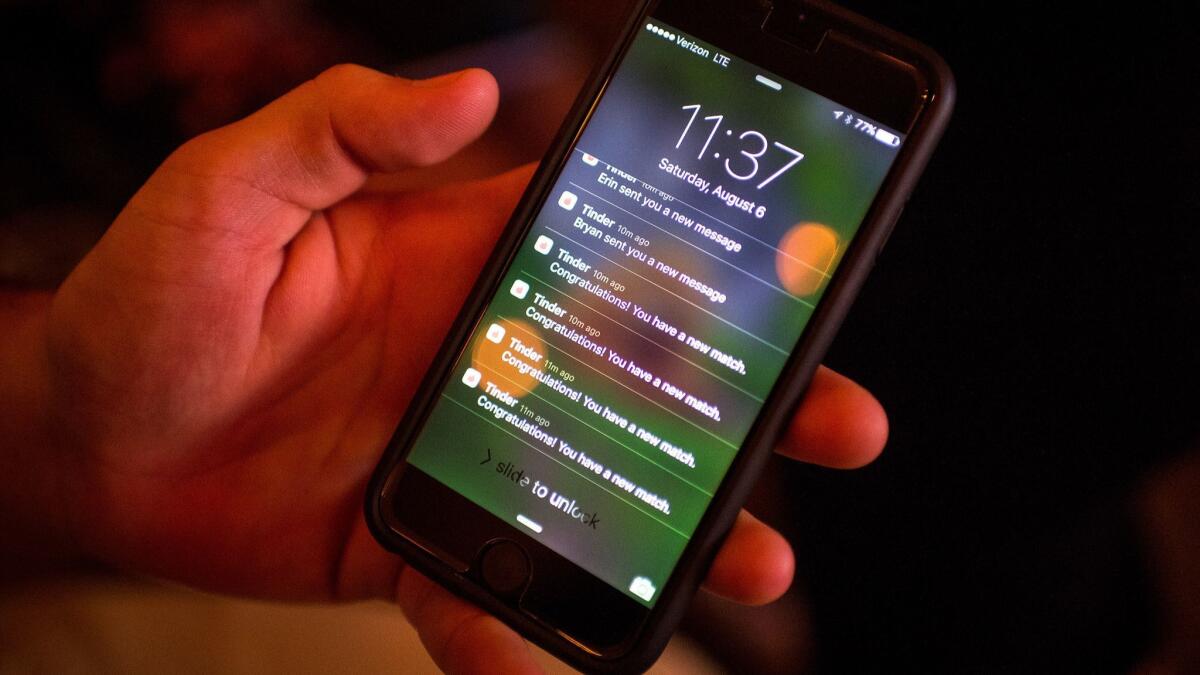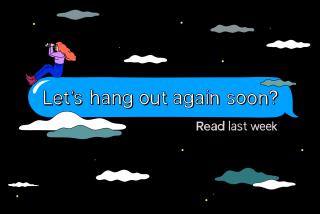Column: You may not be as attractive as that dating site would have you believe

Nearly 40% of heterosexual couples meet online nowadays, according to a recent study in the Proceedings of the National Academy of Sciences. So who am I to cast doubt on the trustworthiness of dating sites?
That said, be careful.
The Federal Trade Commission filed a lawsuit Wednesday against Match Group, owner of Match.com, Tinder, OkCupid, Plenty of Fish and other dating sites.
It alleges that the company duped “hundreds of thousands” of users into subscribing by making them think they were receiving lots of interest from potential soul mates.
In reality, according to the suit, Match was touting accounts it knew to be bogus and “likely to be perpetrating some form of scam.”
Match “delivered millions of advertisements to consumers touting communications that Defendant knew to be sent by users likely engaging in fraud,” it says.
Worse, the lawsuit says, when users complained or tried to get their money back, Match would deny it did anything wrong.
Although these sites are open to nonpaying users, you can’t unlock their full capabilities without paying for a subscription. In other words, if you don’t subscribe, you’re placing yourself at a disadvantage.
“We believe that Match.com conned people into paying for subscriptions via messages the company knew were from scammers,” said Andrew Smith, director of the FTC’s Bureau of Consumer Protection.
“Online dating services obviously shouldn’t be using romance scammers as a way to fatten their bottom line,” he said.
Match Group is owned by IAC, which runs dozens of popular websites, including Angie’s List, HomeAdvisor and the Daily Beast.
I reached out to Match but no one got back to me. The company posted a response to the lawsuit on its site disputing the allegations.
“For nearly 25 years, Match has been focused on helping people find love and fighting the criminals that try to take advantage of users,” it says, noting that the company employs “industry-leading tools and AI” to block fake accounts.
“The FTC has misrepresented internal emails and relied on cherry-picked data to make outrageous claims, and we intend to vigorously defend ourselves against these claims in court.”
I’ll come right out and admit: I have no experience with online dating. My wife and I both acknowledge that if we had to swim in these digital waters, we’d be the loneliest people in town.
So I reached out to dating coaches who could bring me up to speed on the potential pitfalls of cyber courting.
“It’s a jungle out there,” said Johnny Cassell, a London-based relationship expert who also has clients in Southern California. “I’ve heard a lot of horror stories.”
Like other coaches I spoke with, he said success in online dating hinges on having a profile that has a certain je ne sais quoi capable of attracting total strangers.
However, Cassell said, he’s more optimistic about social media platforms such as Facebook and Instagram than digital cocktail parties such as Match and Tinder.
“That’s where you’ll find people who share your interests,” he said.
Amie Leadingham, a Los Angeles dating coach, said 1 out of 6 people meet their future spouse on dating sites.
“I met my husband online,” she said. “I believe in online dating.”
But that doesn’t mean you should approach each digital encounter all starry-eyed and optimistic.
“Is there catfishing and fraud? Yes, there is,” Leadingham said.
Catfishing, if you’re unfamiliar with the term (or the movie and subsequent TV series), is deceiving people online into thinking you’re someone you’re not, typically for a romance scam.
Leadingham said online daters need to develop the skills necessary not just to woo others but also to keep undesirables at bay.
“Use Google,” she said. “Check up on people’s username and profile picture. Also, watch out for anyone who tries to keep the relationship on the phone or who asks for lots of information. Try to meet in person as quickly as possible.”
And now, if the FTC is correct, you need to be suspicious as well of your interactions with the dating site itself.
The agency’s lawsuit alleges that Match would send ads to users suggesting that the recipient was quite the Romeo or Juliet among other denizens of the site.
“Many consumers purchased subscriptions because of these deceptive ads, hoping to meet a real user who might be ‘the one,’” the FTC said.
“Consumers who considered purchasing a Match.com subscription generally were unaware that as many as 25% to 30% of Match.com members who register each day are using Match.com to attempt to perpetrate scams, including romance scams, phishing schemes, fraudulent advertising and extortion scams,” it said.
And then, insult to injury, the site would go out of its way to make it difficult for people to cancel their accounts, the lawsuit says.
In its rebuttal, Match said that “fraud is never good for business, which is why we spend so much time, money and emotional capital to fight it.”
“The issues the FTC is focusing on have either been taken grossly out of context or permanently eliminated by Match,” it said, adding that “the FTC is wildly overstating the impact of fraudulent accounts.”
Perhaps. Or perhaps not.
I may not know much about online dating, but I do know a thing or two about online scams.
I’m comfortable saying that if there’s a venue where people congregate online, there will be scammers doing their darnedest to fleece the unwary.
The added danger expressed by the FTC’s lawsuit is that the dating site itself also may be trying to take advantage of you. That’s just one more thing to watch out for.
As if this whole thing wasn’t hard enough already.







